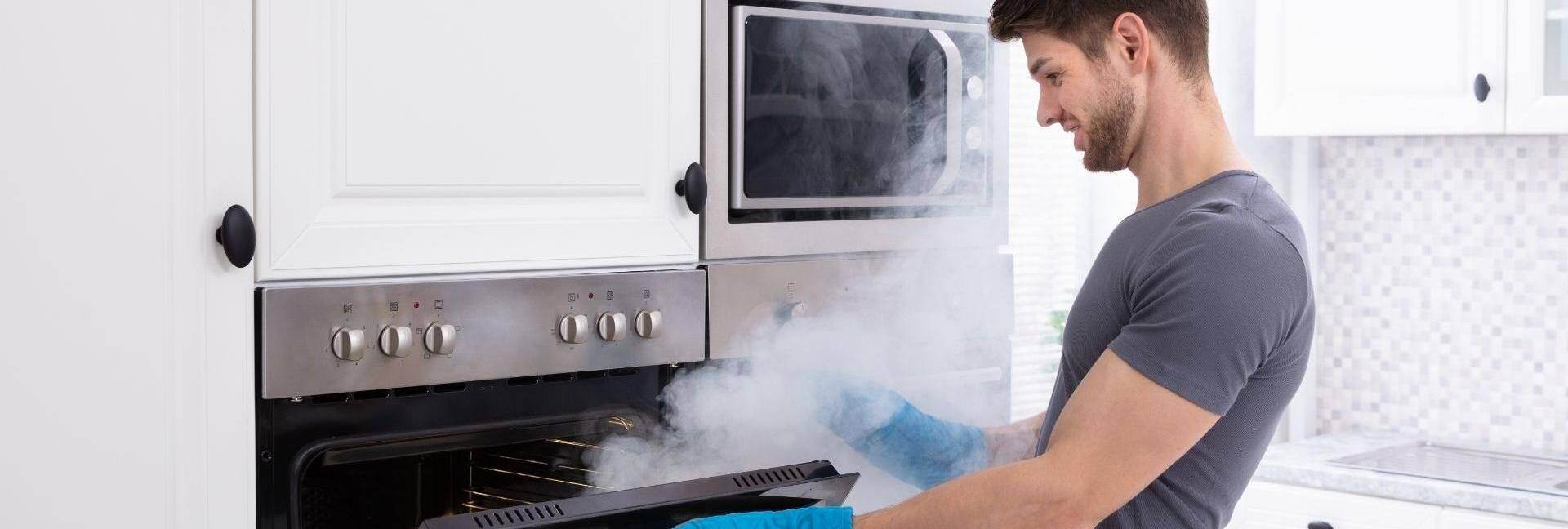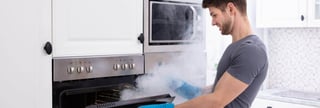What makes an oven smoke?

Key tips to remember
- New ovens come with a factory coating so manufacturers recommend a “burn in” period before use.
- Skip chemical oven cleaners, and clean the oven at least once a month with natural ingredients.
- Use the self-cleaning cycle sparingly to avoid a full-fledged fire hazard.
- Position food about 3 inches below the broiler, and check on meats and foods with higher fat contents that can drip.
- Get a home protection plan and save the hassle replacing a faulty heating element or other part.
You know the saying: Where there’s smoke, there’s fire. So it should always raise an alarm when we notice smoke coming from the oven. But, more often than not, you can have an oven smoker situation on your hands, and you didn’t even burn the meatloaf! What other mystery could cause a smoking oven? With the holidays approaching and many hearty meals on the horizon, avoiding a house filled with smoke from cooking is definitely a goal. Here are the primary reasons for a smoking oven, along with preventive measures you can take and tactics to rid your home of the smoke and smell.
Is the oven brand new?
These days, there is a new-oven smell, and it’s smoky. This is the one instance where there’s likely nothing wrong with the actual oven at all. Oven ranges today come with a factory coating that dissipates after the first few uses, so it’s actually normal to see a new oven smoke. But is it safe to cook in a brand-new oven?
To prevent the smoke from potentially affecting the taste of your food, manufacturers of top oven brands recommend running your oven at a high temperature for about 30 minutes with nothing in it, known as “burning in” the oven. Do this at least a few days before any high-profile cooking so you don’t smoke up the house when family or friends are over. It’s wise to always give the owner’s manual a thorough read before using any appliance — no matter how familiar it may seem to you.
Are there food spills from past use?
If you have a used electric oven, as the majority of kitchens have, then the most likely reason for a smoking oven is that the ghosts of food-spills past have come to haunt you. The prime culprits tend to be juicy meats, like the standing rib roast or stuffed turkey we tend to serve on special occasions, and frozen pizzas placed directly on the rack, which all the packages seem to recommend. After repeated cooking sessions with foods like these, a layer of grease and food particles starts to build up in the bottom of the oven and on the racks, charring and smoking as it cooks with the current meal. Obviously, a good cleaning is due.
To get the smoke under control, first, turn off the oven, let the smoke out and wait for the oven to cool down. Then, remove the racks — along with your meal, unfortunately — and use a wet rag to clean any larger pieces of charred and ashy food debris out of the oven. You’ll still need to go back in for a deeper cleaning — especially for tougher buildups — but we’ll get to that in just a minute. To make future cleaning easier, you can place an oven-safe mat or a sheet of foil on the lowest layer or rack of your oven to catch food spills. Make sure not to cover the floor of the oven because this will obstruct the heat airflow.
Did you recently clean the oven?
The usual reason for a used oven smoking is that it’s due for a thorough cleaning, but an oven can also smoke because you just cleaned it. Wait, what? This can be caused by the cleaning method — especially if you used one of those official oven cleaners from the store or another type of cleaning spray. These cleaners can leave behind a chemical residue that continues to burn off, causing oven smoke.
You definitely don’t want to burn chemicals in your home because the fumes can be particularly unhealthy, so the best way to clean an oven is to go natural. First, do a general wiping inside with warm, soapy water. Next, make your own oven-cleaning scrub:
- Combine 3 parts baking soda, 1 part warm water and the zest of one lemon into a paste.
- Spread it around everywhere inside the oven — but avoid the heating elements — and let it sit overnight. Wipe away with warm water using a sponge or cloth — or a spatula for stubborn areas.
- Do a final spray with equal parts vinegar and water, which will foam up on the remaining paste, and wipe away with paper towels or cloths.
Did you run the self-cleaning feature?
Self-cleaning oven smoke is a common occurrence. Unfortunately, ovens cannot be relied on to fully clean themselves. In fact, running your oven on the self-cleaning mode without some preliminary elbow grease on your part can even be dangerous. This is because self-cleaning ovens reach high temperatures that can produce smoke and fumes when food debris or the lining starts to burn. If grease was spilled inside, these high temperatures can even cause an oven fire.
For safety, any loose food particles or liquid grease that is not baked on should be wiped out of the oven before running the self-cleaning cycle. If the oven starts to smoke heavily or you see flames due to excessive grease spills inside, switch it off immediately and leave to cool for at least one hour. Make sure to always ventilate the kitchen by opening windows or running the exhaust fan, and pay attention to how long and often you run the self-cleaning mode. Start the cycle for the shortest-possible duration, and try not to use it more than five times per year.
How did you position the food?
It’s easy to place food too close to the broiler — particularly when we bake and roast larger portions to feed a crowd. The broiler gets super hot and can easily scorch your turkey or casserole, causing smoke. You may ask, where is the broiler in my oven? The broiler heating element is at the top, so arrange the racks in order to maintain at least 3 inches of space above your food, and always babysit anything you are trying to broil with the oven door cracked open.
This also applies to the main heating element, which is at the bottom of the oven. Keep in mind that juicier meats and foods with higher fat contents are prone to drip grease and cause oven smoke if cooked on high temperatures, so allow enough cooking time to keep it low and slow.
Is there a faulty heating element?
Sometimes, there’s simply something wrong. Electric oven smoke can mean the top and bottom heating elements have worn out. Excessive heat buildup, such as during the self-cleaning cycle or while cooking at high temperatures, can cause a short in these elements. When this happens, you can often hear a buzzing sound before the heating element short-circuits and starts creating smoke. If the elements are not glowing red, they are likely burned out.
In this case, turn off the power at the circuit breaker or unplug the oven. You’ll need to remove the parts and replace them. If the oven is new, hopefully, you can tap into your warranty. This is where a Cinch home protection plan can really come in handy, saving you the hassle of trying to track down an oven repairman and come up with unexpected funds — especially if you have guests depending on a delicious holiday meal soon.
How do I get rid of the smoke and smell?
First things first: Turn on the exhaust fan above the range to suck up the smoke. Then, open windows and doors to let in fresh air and ventilate the room. It’s best to open ones at opposite ends, which creates a cross breeze. The smoke often leaves your house faster than the lingering smell, but you can speed up the process. Vinegar acts as an excellent odor-eliminator, so add 1 cup of white vinegar to 3 cups of water, and boil in a pan on the stove. To add some festive holiday ambience, get out another pan to simmer spices, such as cinnamon sticks and cloves, and throw an apple into the mix. Lighting a few scented candles doesn’t hurt either.
If you’re cooking and have a house filled with smoke but no fire, it’s often the result of a smoking oven. Cleaning your oven interior regularly, at least once a month and right away after any food spills, is important for home safety. To help relieve the stress of trying to decipher smoke signals from your oven, consider investing in a home protection plan from Cinch. It only takes a few minutes to ensure your holiday cooking plans don’t go up in smoke.
The information in this article is intended to provide guidance on the proper maintenance and care of systems and appliances in the home. Not all of the topics mentioned are covered by our home warranty or maintenance plans. Please review your home warranty contract carefully to understand your coverage.
